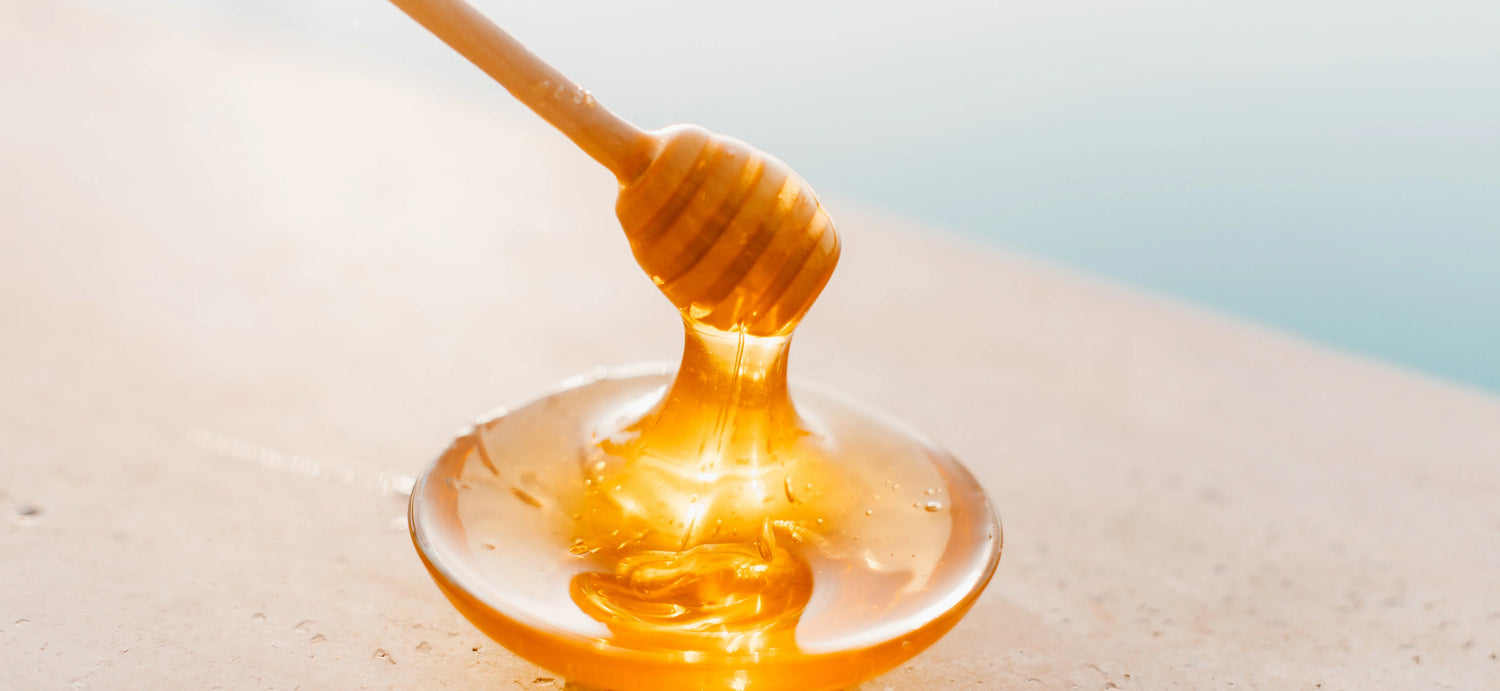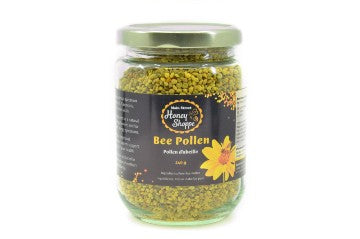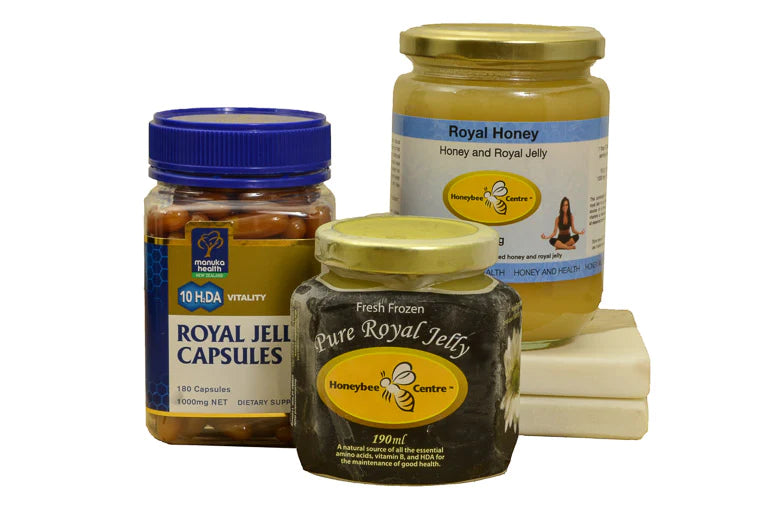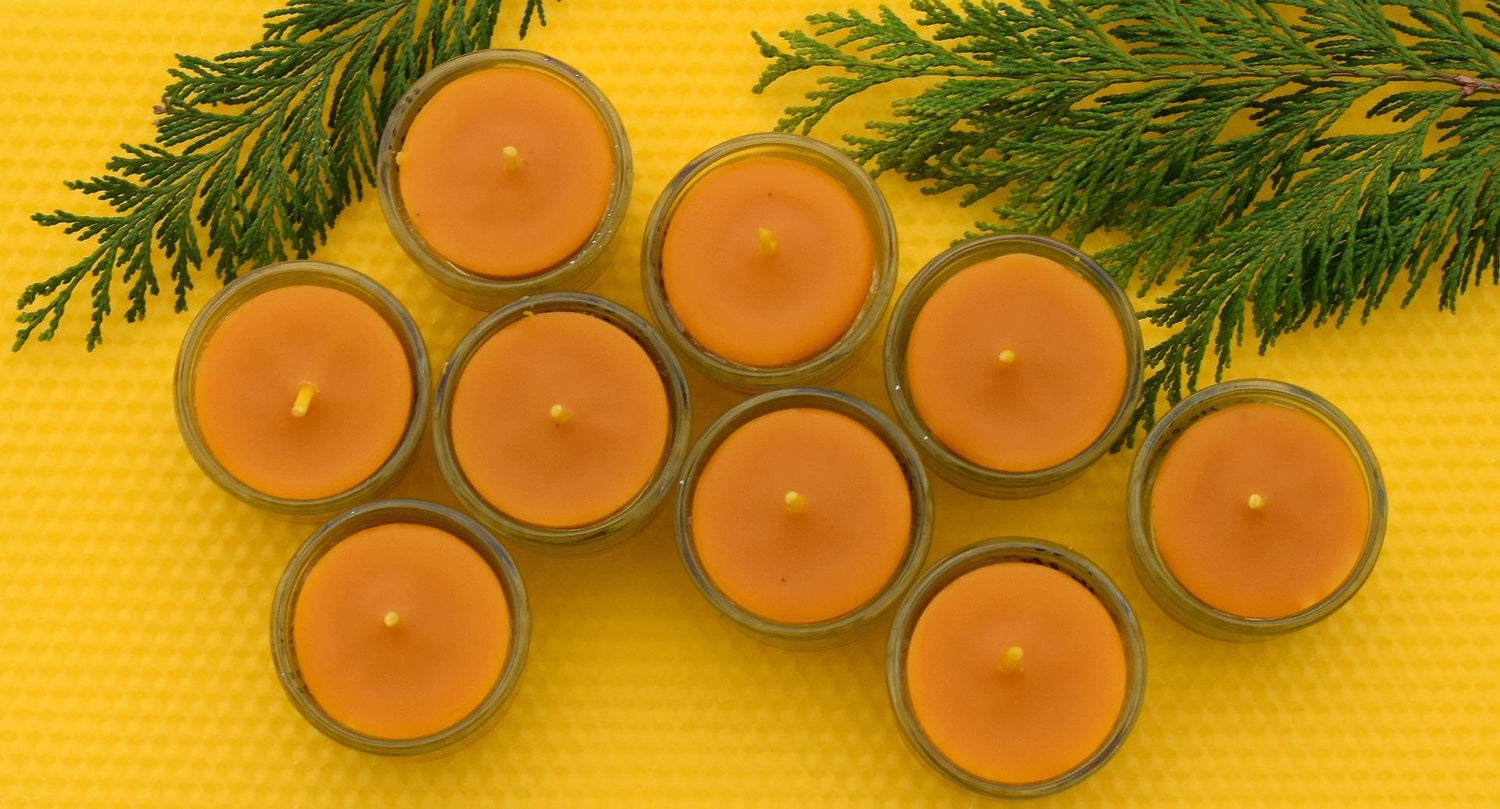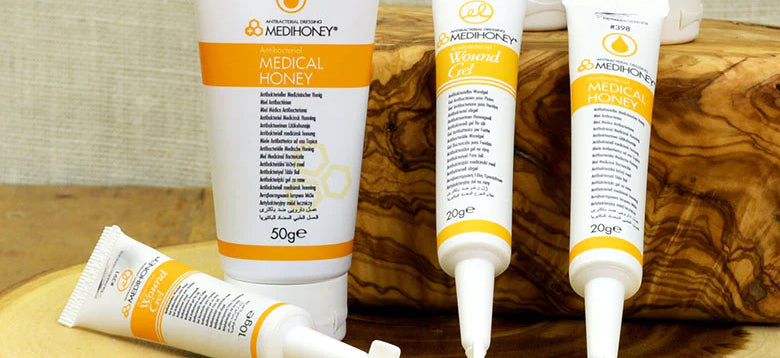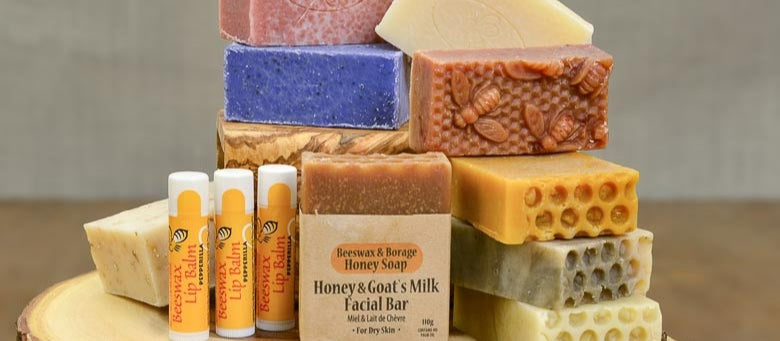-
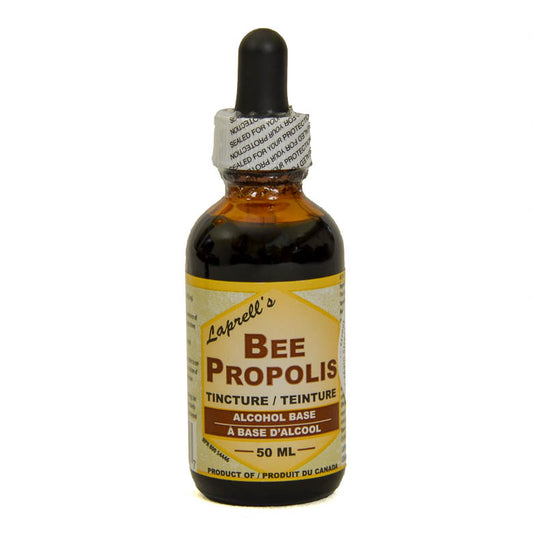
Bee Propolis Tincture - Alcohol base
Regular price $25.99 CADRegular priceUnit price per -
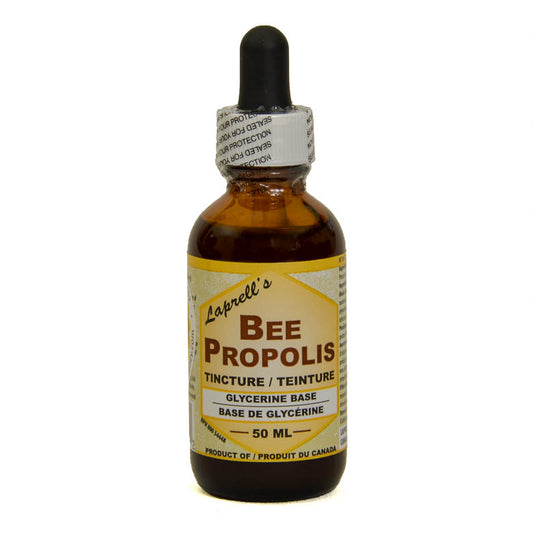
Bee Propolis Extract - Alcohol Free
Regular price $25.99 CADRegular priceUnit price per -
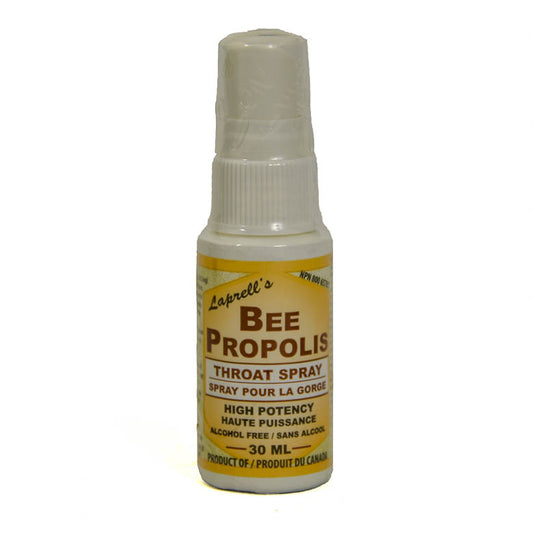
Bee Propolis - Throat Spray
Regular price $14.95 CADRegular priceUnit price per -
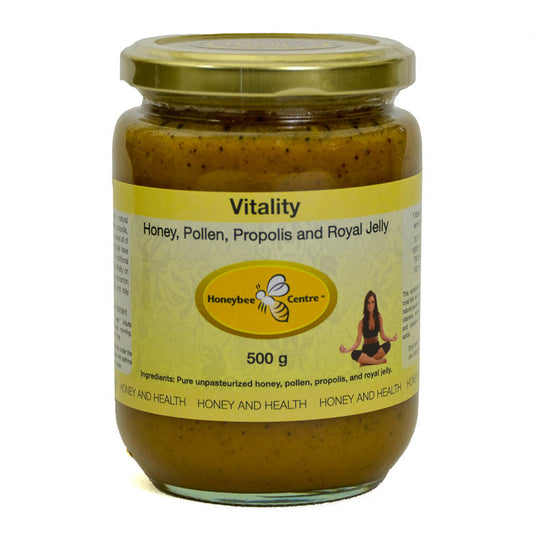
Vitality - Honey Infused with Bee Pollen, Propolis, and Royal Jelly
Regular price $27.99 CADRegular priceUnit price per -
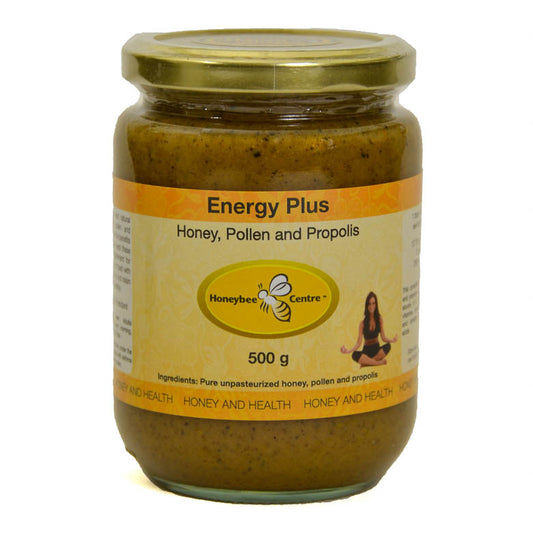
Energy Plus - Honey Infused with Bee Pollen and Propolis
Regular price $19.99 CADRegular priceUnit price per -
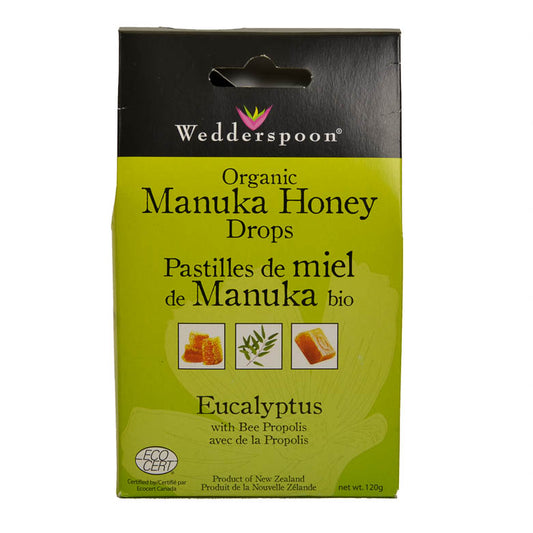
Manuka Honey Drops - Eucalyptus with Bee Propolis - Organic
Regular price $10.99 CADRegular priceUnit price per -
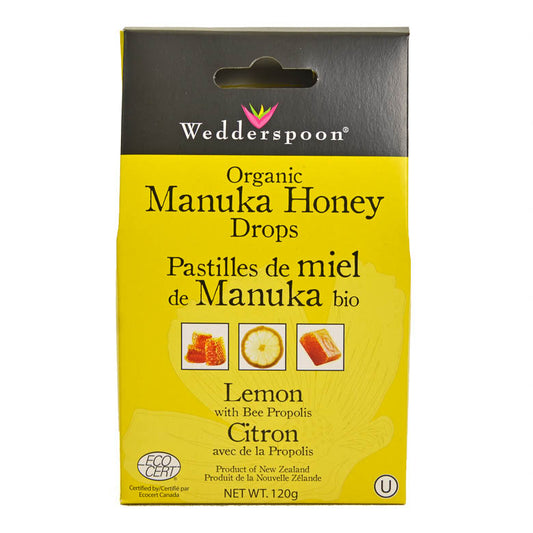
Manuka Honey Drops - Lemon with Bee Propolis - Organic
Regular price $10.99 CADRegular priceUnit price per
What is Propolis
Honeybees collect resins exuded from leaf buds and bark of certain trees and mix the resin with a little beeswax, honey, and bee produced enzymes. This sticky substance, propolis, is highly bioactive with significant antimicrobial, antioxidant, and anti-inflammatory properties. The bees use propolis as part of the global immune system of the colony by coating the entire inside of their hive with propolis, including inside the cells where the queen lays her eggs, and at the entrance to the hive so that every bee coming and going has to walk over the propolis door mat. Propolis is also used by the bees to seal any cracks and unwanted openings in the hive. The word propolis originates from Greek: «pro» = in front, «polis» = city. The meaning “in front of the city” well suits the protecting role of propolis for the bee colony. The Greek word propolis also means “to glue” and describes the role of propolis to cement openings of the bee hive.
Uses of Propolis
Propolis is most widely used in natural medicine as a health enhancing food supplement. It is usually taken orally in the form of an extract or capsule. People take propolis to support their immune system in fighting off cold and flu infections because of the strong antibacterial and antiviral activity of propolis. Propolis is also a highly concentrated antioxidant because of the high concentration of antioxidant phenolic compounds found in propolis. The action of reducing oxidative stress also supports a reduction in inflammation in the body. Propolis is often used as a daily supplement because of this antioxidant capacity.
Propolis is also widely used topically because of its antibacterial and antifungal properties for wound healing and in ointments for various skin ailments.
Temperate “poplar” and tropical “Green” Propolis from Brazil
In temperate climates such as North America and Europe, honeybees generally collect resin from poplar trees to make propolis. Another well studied propolis is the “green” propolis from Brazil where the bees collect resin from the Baccharis plant. Propolis is a very stable substance and is available in a variety of forms.
-
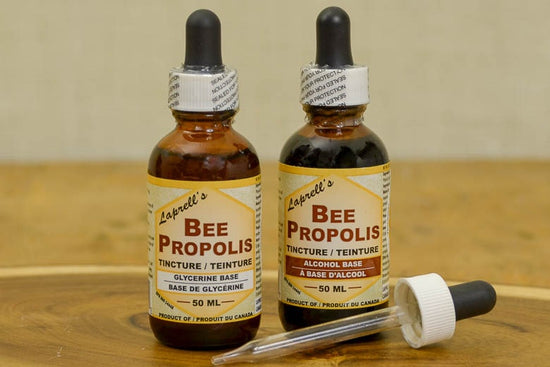
Propolis Extract
Propolis is most commonly taken in extract form in natural medicine for immune system support. Ethanol is the most common solvent used to extract the active components from the propolis resin. The alcohol based propolis (also known as a “tincture”) is the fastest acting method but has a very strong taste. A glycerine based extract is available for those who do not like the strong taste of the alcohol extract, or do not want to consume any alcohol.
Our propolis extracts are all manufactured in Canada:
“red” poplar propolis – Available in both Alcohol and Glycerine extracts – made from premium raw propolis from western Canada
“green” Brazilian propolis – Available in an Alcohol extract – made from a combination of “green” propolis from the Brazilian rain forest and “poplar” propolis from North America
-
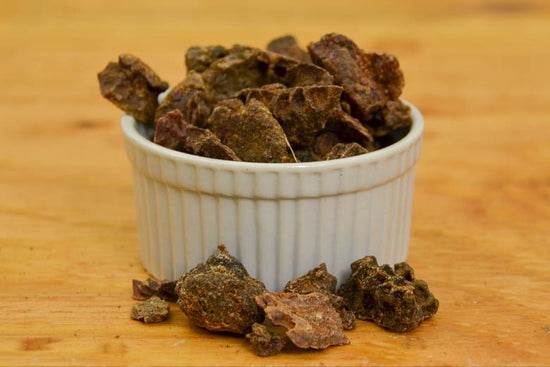
Raw Propolis
- Raw propolis is the least common form in which to use propolis. The propolis resin is hard to digest and may stain anything that it comes in contact with.
- NOTE: Limited availability
- Our raw bee propolis comes from Western Canada and is certified organic.
- Propolis is used in healing ointments for its antimicrobial and anti-inflammatory properties. Typical uses are for relief from skin ailments such as eczema and for minor cuts, scrapes, and burns to prevent infection and promote healing.
- We have a number of healing ointments for a variety of skin conditions which contain propolis.
-
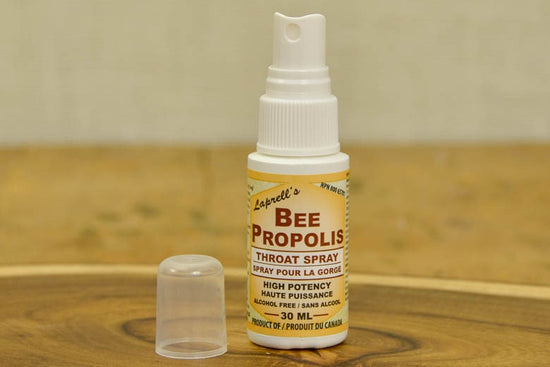
Propolis Throat Spray
- Propolis in throat spray form is primarily used to relieve sore throats and combat other mouth and throat infections.
- We carry both alcohol based and alcohol free throat sprays made from premium Western Canadian Bee Propolis.
-
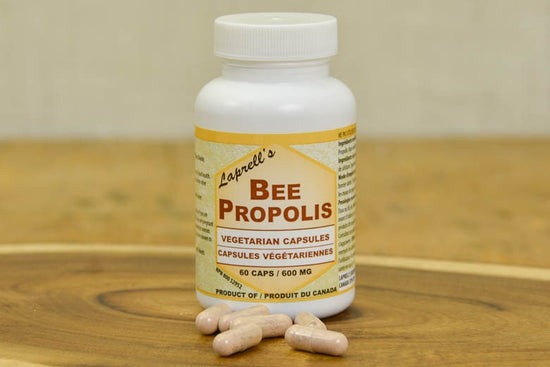
Propolis Capsules
- Propolis in capsules provide a convenient way to take propolis for people on the go.
- Our bee propolis capsules are made from premium Western Canadian Bee Propolis.
Composition of Propolis
Propolis is a complex natural substance that contains hundreds of compounds.
Composition of raw “Poplar” propolis
|
Category |
Substances |
|---|---|
| BALSAM (Resins)
40 – 70 % Ethanol soluble Poplar origin |
Phenolics
Phenols, phenolic acids, esters, flavanons, dihydroflavanons, flavons, flavonols, chalkones, phenolic glycerides Others: Aliphatics: acids, alcohols, esters, aldehydes, ketones, benzoic acid and esters |
| BALSAM (Essential Oils)
3-5 % Ethanol soluble Poplar origin |
Mono-, and sesquiterpenes |
| NON-BALSAM
Ethanol insoluble Wax: 20-35 % Beeswax origin |
Beeswax components |
| Others:
5 % Partly ethanol soluble Bee and Pollen origin |
Mainly minerals average ash content 2.1 %
Polysaccharides :2 % Proteins, amino acids, amines and amides: 0.7 % Traces of carbohydrates, lactones, quinones, steroids, vitamins |
Primary Health Enhancing Benefits of Propolis
-
Powerful Antioxidant and Detoxifier
Propolis is a powerful antioxidant with corresponding anti-inflammatory properties. Active free radicals are involved in almost all the cellular degradation processes and leads to cell death. Oxidative stress is thought to contribute to the development of chronic and degenerative diseases such as cancer, autoimmune disorders, aging, cataract, rheumatoid arthritis, cardiovascular and neurodegenerative diseases. Propolis can be regarded as a supplement helping to prevent chronic degeneration diseases.
-
Immune System Support
Propolis has been shown to stimulate the immune system in its constant battle against invading viruses and bacteria. This may provide protection against infections of all sorts including colds and flus.
-
Promotes Healing of Wounds & Skin Ailments
The antibacterial and antifungal properties of propolis help protect against infection and promote healing of cuts, scrapes, burns and skin ailments such as eczema.
Biological Active Ingredients in Propolis
Hundreds of published studies over the last 40 years describe the many biological and health enhancing properties of propolis. It is astonishing, that while the composition of the different type of propolis differs greatly depending on its botanical origin, the biological effects of the different propolis types are very similar.
Biologically active ingredients in Poplar and Baccharis (Brazilian “green”) propolis
|
Biological Activity |
Propolis Type: Active Ingredients |
|---|---|
| Antibacterial | Poplar: different flavonones, flavons, phenolic acids and their esters
Bacharis: prenylated p-coumaric acids, labdane diterpenes |
| Antifungal | Poplar: pinocembrin, galangin, benzoic acid, salycilic acid, vanillin
Baccharis: mono and sesquiterpenes, Artipellin C |
| Antiviral | Poplar: Polyphenols, phenyl- carboxylic acids, and esters of substituted cinnamic acids, caffeic acid, quercetin, luteolin, fisetin, quertecagetin,
Baccharis: activity detected but no substances identified |
| Antioxidant
Radiation protective |
Poplar: different flavonoids phenolics and their esters
Baccharis: different prenylated p-coumaric acids and flavonoids |
| Hepato-protective | Poplar: different flavonoids, CAPE, ferulic acid, caffeic acid
Baccharis: different prenylated p-coumaric acids, flavonoids, lignans |
| Anticancer and
antitumor |
Poplar: CAPE, caffeic acid, caffeic acid phenylethyl ester, apigenin, quercitin, genistein, rutin, p-coumaric acid, and ferulic acid, kampferol, naringenin
Baccharis: artipelline C, baccharin, drupanin, cinamic acid derivatives, prenylated p-coumaric acids, clerodane diterpenes,benzofuranes |
| Immuno-modulating | Poplar: CAPE, chriysin, benzylcaffeate, phenethylferrulate, cinamic acid
Baccharis: caffeoylquinic acid derivatives, clerodane diterpenoid, artipelline C |
| Anti-inflammatory | Poplar: flavonons, flavons, phenolic acids and their esters
Baccharis: artipelline C |
| Cardio-protective | Poplar: CAPE, acacetin, chrysin, quercetin
Baccharis: caffeoylquinic acid |
| Anti-ulcer | Poplar: CAPE, caffeic acid, pinocembrin, galangin, chrysin
Baccharis: ferulic, p-coumaric and cinnamic acids, |
What Our Customers Say
-
Sareeta
Vancouver BCI’ve been enjoying Vitality for four years! Since the pollen is local, it makes the seasonal allergies so much more bearable. I’ve had seasonal allergies since I was child, and we tried everything. So grateful for this!













